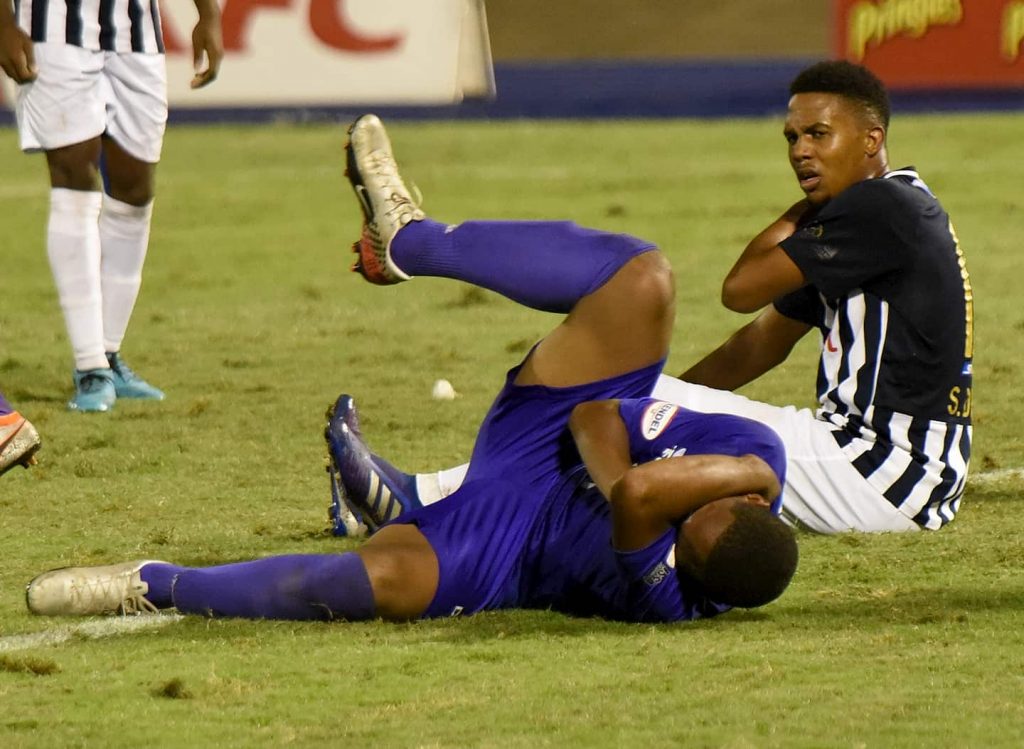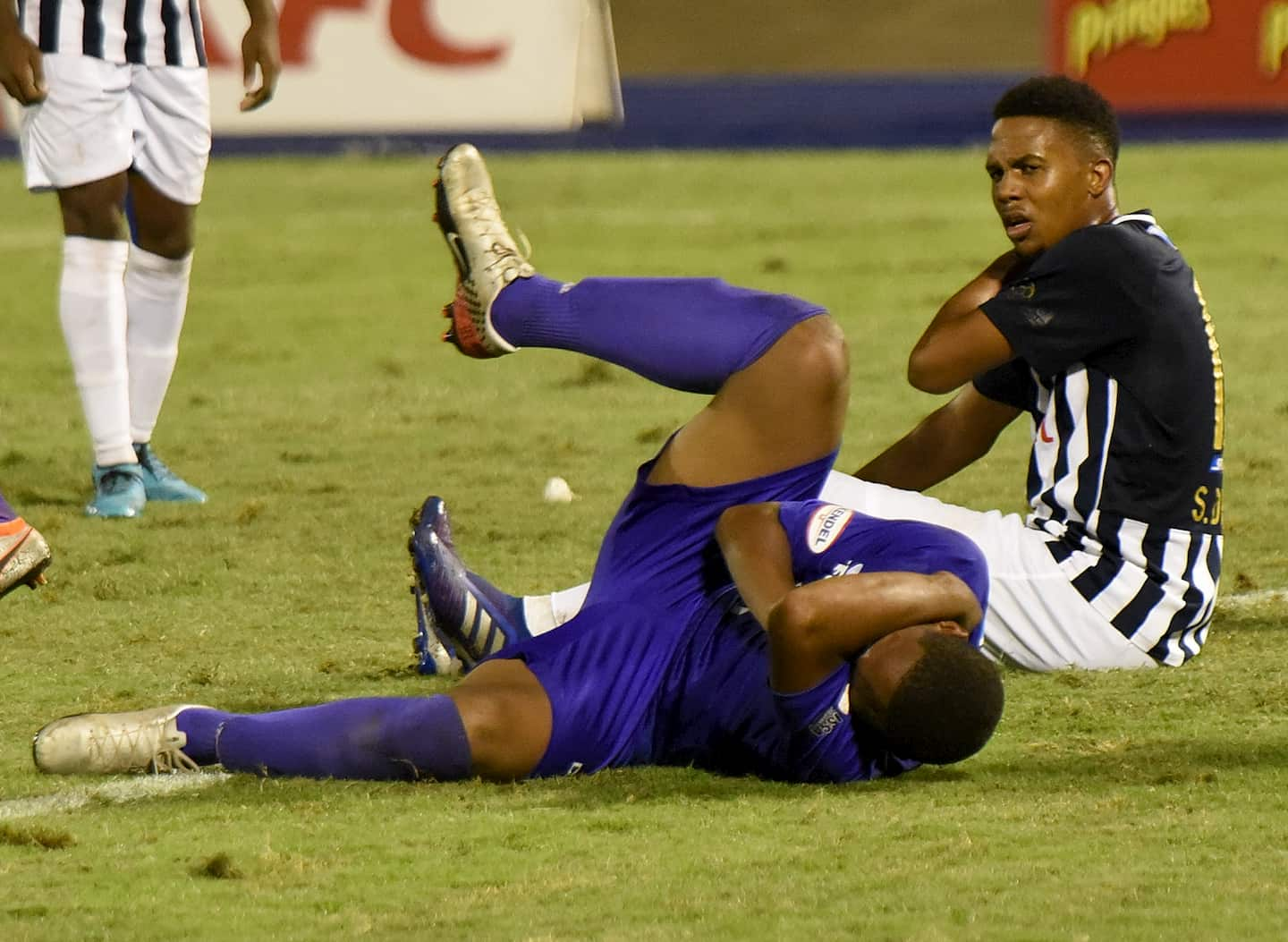Biting in sport has again become a topic of discussion following an incident in the Corporate Area Manning Cup football semi-final game in which Kingston College’s (KC) Khalifah Richards, sunk his teeth into the shoulder of Jamaica College’s (JC) Shadane Lopez. Action, or lack of it, by game officials and those in charge of the competition, Richards’ school, KC, and the Inter-Secondary Schools Sports Association (ISSA), highlights weak leadership to ensure punishment by those running the sport, and a failure to enforce the rules and penalise players. Richards was actually a substitute, who had replaced the injured full-back, Luis Watson, in the match that JC won 5-4 in a penalty shoot-out, following a goalless finish.
The bizarre off-the-ball-incident occurred in the second half, as the players lined up for a JC set-piece and Richards, who stood behind Lopez while marking him, did the unthinkable. Lopez, which by reasonable analysis, could be judged to have acted on reflex reaction, reacted by swinging his arm and hit Richards in the face. As bizarre the incident, what happened next was equally mind-boggling, when referee, Veralton Nembhard, showed both players a yellow card, and not red. Also, as the incident took place in the 18-yard box, there was a clear case for a penalty being awarded to JC. Further, a red card means automatic expulsion from not only that game, but suspension from the other match. As it panned out, both players remained eligible for their team’s next match.

Rules governing the sport clearly mandate the issuing of a red card for violent conduct. This pertains to all team members, to include even persons outside the player contingent who are listed on the match card. Biting, in my estimation, falls within the ambit of violent conduct. That action is not instinctive, not natural. Biting is a violent act largely guided by thought. Incidents like these are not always seen by the referee and because of this, the sports’ world governing body, the International Federation of Football Federations (FIFA), long upgraded the profile of the officials who were formerly called linesmen, to assistant referees. Even then, in their prior designation, they still had the authority to inform the referee of infringements to effect punishment. Those set of eyes have been magnified for the game in the big leagues with VAR. But that’s for another discussion.
Point is, whether Nembhard or his assistants had seen when Richards bit Lopez or the latter’s reaction, there was conviction something happened that warranted issuance of a card. Evidence that the referee knew enough about the incident to have delivered the proper penalty, was corroborated by Lopez, who was quoted in a newspaper article. “Before the referee reached, I walked to him and showed him the bite before he gave me a red card,” said Lopez. “He was saying both of us were going to get a yellow card and me and Khalifah agreed, and we just continued playing.”
Players have now even become part of the decision-making for incidents that contravene the rules of play in a big way. I really do sympathise with Lopez. He brought none of this unto himself. As for Nembhard, this should have been a case of enforcement. Red card to both players. Full stop. Penalty to JC. Then onto ISSA’s disciplinary panel to decide further action. Consequently, ISSA’s disciplinary committee met and according and took no further action. That is quite scary in terms of the precedent it has set for schoolboy sport. Frankly, their decision is even worse than that of the match officials because they had the benefit of photos, video evidence and time. Incidents like these are not common in sport, but they happen from time to time and punishment is severe because biting takes a chunk out of every conceivable ideal and intent of sport.
In football, there have been some notable biting incidents, with former Liverpool and present Barcelona superstar, Luis Suarez, among the most notorious for chomping on opponents. So far, he has bitten opponents on three occasions: firstly in 2010 while playing for Ajax Amsterdam, when he bit PSV Eindhoven’s Otman Bakkal. For that, Suarez was banned for seven matches. On the second occasion, Suarez was playing for Liverpool against Chelsea FC in and English Premier League football match when he sunk his teeth into Branislav Ivanovic. On that occasion, both the English Premier League and Suarez’s club, Liverpool, banned him for 10 matches. Then in 2014, on football’s biggest stage, the World Cup Finals, Suarez, representing his country Uruguay, took a bite out of Italy’s Giorgio Chiellini’s shoulder. For that, FIFA banned Suarez from playing the sport for four months.
While Suarez has been most consistent in repeating this dastardly act, perhaps the mother of all biting incidents of sport belongs to former world heavyweight boxing champion, Iron ‘Mike’ Tyson, during the rematch for the world heavyweight title against fellow American, Evander ‘The Real Deal’ Holyfield, in 1997. This biting incident in sport was as bizarre as they come, with Tyson taking off a piece of Holyfield’s ear in the third round. That was shocking. But even worse, was the referee’s decision to allow the fight to continue. Tyson’s follow-up showed what can happen when officials fail to instantaneously hand down proper punishment when persons who commit an awful act are allowed to continue competing. Amazingly, Tyson bit Holyfield a second time. This time the fight was stopped. Later, Tyson was fined US$3 million and his boxing licence was revoked. After being exiled from the sport for one year, Tyson’s boxing licence was reinstated.
The punishment meted out by the respective authorities in matters of biting reflect the severity with which it is viewed and deserving. Those entrusted with the responsibility of watching over affairs governing teams and sport must be bold to treat with the heavy penalties required. It could resurface with biting consequences.
Audley Boyd is a former sports editor at The Gleaner.







